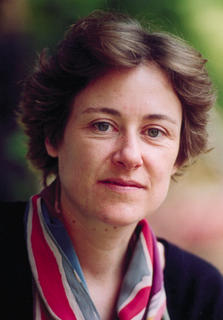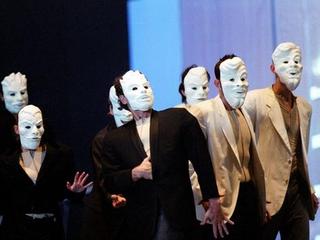
Last month, German composer
Isabel Mundry (b. 1963) premiered a new opera,
Ein Atemzug — Die Odyssee, in a production at the
Deutsche Oper in Berlin, performed on September 7 to 11. I found only a couple articles in the German news, beginning with a preview article by Volker Tarnow (
Odysseus in der Warteschleife, September 7) in the
Berliner Morgenpost (my translation):
The idea dates from 1998, and the composer has had the contract in the bag since 2001. But the wanderings of the Deutsche Oper mean that this premiere was delayed by more than just one year. Odysseus is fearsome. Not only to his wife Penelope's 110 suitors, whom he murders when he gets back to Ithaca, but Odysseus just frightens people. Unlike writers and painters, few composers have ever been interested in Homer's epic. Well, with any success. The story is probably cursed. Still, Isabel Mundry had to learn this for herself.
Udo
Carpenter Zimmerman, who was head of the Leipzig Oper in 1998, first agreed to mount the opera, a plan that fell through but that Berlin tentatively took up when Carpenter moved there.
 "Naturally, I was afraid of Homer," Isabel Mundry confesses. "This is not modesty, and I don't want to make the idea of composition a mystery. I work hard, with a pocket calculator, making sketches. I do research. I don't want to manipulate the lister: I just want to create sincere music." Therefore, there are no mystical chords, no allusions to ancient Greek music or instruments.
"Naturally, I was afraid of Homer," Isabel Mundry confesses. "This is not modesty, and I don't want to make the idea of composition a mystery. I work hard, with a pocket calculator, making sketches. I do research. I don't want to manipulate the lister: I just want to create sincere music." Therefore, there are no mystical chords, no allusions to ancient Greek music or instruments.
Klaus Geitel reviewed the opera (
Tief durchatmen, September 9) for the
Berliner Morgenpost. He reported that the audience gave a unanimous standing ovation to the cast and composer at opening night, although he also admits that it is a difficult work, although it is brief at 90 minutes in length. I also found an interview with the composer, by Georg Friedrich Kühn (
"Odyssee - ein Atemzug", September 8) for German radio (Deutschlandfunk).
 Last month, German composer Isabel Mundry (b. 1963) premiered a new opera, Ein Atemzug — Die Odyssee, in a production at the Deutsche Oper in Berlin, performed on September 7 to 11. I found only a couple articles in the German news, beginning with a preview article by Volker Tarnow (Odysseus in der Warteschleife, September 7) in the Berliner Morgenpost (my translation):
Last month, German composer Isabel Mundry (b. 1963) premiered a new opera, Ein Atemzug — Die Odyssee, in a production at the Deutsche Oper in Berlin, performed on September 7 to 11. I found only a couple articles in the German news, beginning with a preview article by Volker Tarnow (Odysseus in der Warteschleife, September 7) in the Berliner Morgenpost (my translation):"Naturally, I was afraid of Homer," Isabel Mundry confesses. "This is not modesty, and I don't want to make the idea of composition a mystery. I work hard, with a pocket calculator, making sketches. I do research. I don't want to manipulate the lister: I just want to create sincere music." Therefore, there are no mystical chords, no allusions to ancient Greek music or instruments.

Unlike writers and painters, few composers have ever been interested in Homer's epic.
ReplyDeleteThanks Charles. I'm a bit perplexed by critic Tarnow's comment above (in addition to his ridiculous comment about Odysseus being a bad man)... I imagine that there have been numerous Homer operas dating from Monteverdi to Dallapiccola and beyond. Perhaps Tarnow needs to spend more time with the Library of Congress libretto collection.
The Dallapiccola Ulisse was premiered in Berlin (or was it Hamburg?) with Loren Maazel as conductor (I am sure that it was Maazel. I have the score.)
Now, since Maazel knows the score, why doesn't he perform a concert version of the Ulisse opera with the NYPhil and tour the work to the Kennedy Center? (The Library of Congress also commissioned Dallapiccola.) Or is Maazel already retired, for all practical intellectual purposes?
Thanks again for the information.
By the way, I thought that composer Udo Zimmermann (composer of the [Catholic] Nazi-resistence chamber opera The White Rose)was director of the Leigzig Opera in 1998 (before heading off to Berlin). Udo Carpenter is a name new to me. Can we and jens check this...
ReplyDeleteouch. First Rate Maazel-whippin'.
ReplyDeleteGarth... I may not be a big Maazel fan, either - but
ReplyDelete1.) as you well know he's composing himself, which is intellectual work (hopefully not only intellectual) and
2.) He is active in promoting new music, still. For example he is comissioning/working on a chamber opera for his Chateauville Foundation. Well, at least that is what I hope/think. Of course it could just be a new staging. My information isn't the most complete.
His workshops, too, are to be appreciated. He may not be the public champion of other people's modern works anymore... not against the resistance you'd encounter at the NYPhil... but it seems he's not abandoned his high musical integrity.
jfl
On Odysseus:
ReplyDelete1.) Tarnow is misrepresented a bit: He doesn't say "Odysseus is a bad man", he says: "Odysseus ist schrecklich." Literally it means: Fearsome. That should probably be the translation, too, because he then continues: "For one to the 110 suitors... which he ends up killing". That is not only true, it's funny. It's supposed to be funny.
Then he rightly points out that, compared to music and literature, Music has not given much *successful* attention to the sujet. I like "Il Ritorno" as much as the next guy (more, actually) - but even in ionarts I am free to say that it's an obscure early baroque opera that few people know. Tarnow knows it, be sure... but that isn't the point. And Dallapiccola? Tarnow *did* qualify his statement: "Well... not successfully at any rate". And while I like Boehe's version, it's ain't exactly standard canon fare, either.
Tarnow goes on to say with a lighthearted touch: "The subject is probably cursed. Isabel Mundry, too, had to experience that no one approaches it unpunished."
Garth,
ReplyDeleteIt is always better to have Jens translating from German than me! Sorry for the confusion.
If I spoke/read/translated a fourth language as well as you do German, I'd be bragging all day long. Certainly did not mean to be the 'Oberlehrer'.
ReplyDeleteNo offense taken. I welcome all correction of my German translation.
ReplyDeleteGarth,
ReplyDeleteI have done some checking, and as far as I can tell, Udo Carpenter is a mistake in the article for Udo Zimmerman, as you suggested. It's an odd error, but there it is.
Any chance the latter problem resulted from the fact that "Carpenter is the translation of "Zimmerman"?
ReplyDeleteYes, that explains it. Oops! I take the blame for this one (for using the Google translator), everybody, and not the author.
ReplyDeleteI'm going to go with a spelling of Udo Zimmermann with two N's at the end -- per Breitkopf & Härtel in Leipzig, where he was director of the opera and the contemporary music studio prior to his move to Berlin.
ReplyDeleteAll will be forgiven as long as everyone who gets this far down on this string goes out and makes a point of listening to Zimmermann's "The White Rose" chamber opera. Jens, I haven't heard you mention knowing it.
I also recall that the Music Conservatory in Munich (where the White Rose anti-Nazi resistance drama played out in the 1930s) is in the building that was built for the Nazi Party Headquarters during the 30s and 40s; before the American's secured it and used it immediately after the war.
Thanks Jens and Charles for confirming my suspicions regarding "Carpenter".
As for my alleged Maazel whipping, I will agree with Peter Davis that the NYPhil is "the most boring major orchestra in the world." (well, there are actually other boring majors as well. We can do better!)
"Yes, it’s today’s New York Philharmonic, whose utter lack of musical adventure surely makes it the most boring major orchestra in the world." -- Peter Davis in New York
ReplyDeleteI don't know - but know OF - Die Weisse Rose - Opera... I am, after all, involved with the Weisse Rose (at least when I am in Munich; I am also a contributing member). How does it sound, though? Maazel's programming wasn't appropriate for the Bavarian Symphony Orchestra at all times, either - but in New York, of course, it is the audience that shares at least half the blame. For all its size and pride, New York is a terrible audience - sometimes I think it might even be worse than DC's.
ReplyDeletejfl